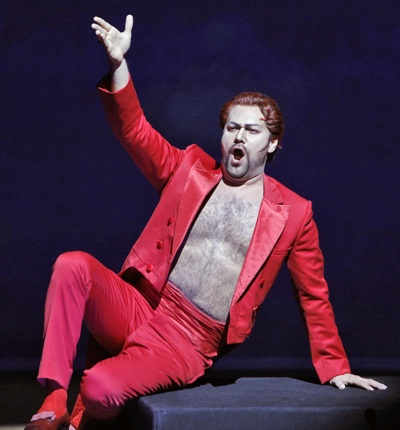
A time for good and evil… and opera
We are at the turning of the seasons, as summer’s bounty fades in the chill of autumn, and it is a traditional time for reflection. In the Hebrew calendar this time is marked with the Ten Days of Awe culminating in Yom Kippur, the Day of Atonement, when supplicants number their sins and failings and look towards personal and community redemption.
Coincidentally, last week the San Francisco Opera opened its season with Mefistofele, Arrigo Boito’s masterwork that explores the striving between good and evil within the human breast. But rather than a day of fasting and quiet contemplation, this was a potboiler of devils and heavenly angels… and lots of nude revelers!
But that’s opera.
Boito, though a renowned librettist, spent many years writing and composing this one opera, ultimately choosing to tell the story from the Devil’s point of view. The Faust myth has endured a number of makeovers over the centuries, from mummers’ play to Marlowe’s 1592 Doctor Faust, and most famously, to Goethe; and musically from Berlioz’ La Damnation de Faust, Gounod’s Faust and Busoni’s Doktor Faustus, along with spin-offs like Stravinsky’s The Rake’s Progress and artist Lynd Ward’s Gods’ Man.
The elements, however, are timeless: the distinction between the paths of knowledge and wisdom, the social contract, a question of faith… and the fine print, of course. When Faust signs over his soul to the devil, he is clearly letting go of any societal expectations:
“About the future not a thought do I give…” he says, referring to the afterworld. In nineteenth century terms, he is demonstrating a lack of faith in devils or divinity. But in more modern terms, he also feels no obligations towards the future of the human race. He is, in other words, a thoroughly modern corporation, and in exchange for understanding the inner workings of the world, he sells his compliance:
“If thou dost bring me one hour
Of peace and quiet, in which may rest my spirit;
If thou wilt myself and the world unveil before me;
If I should haply say to the moment flying:
“Stay thee, for thou are blissful!”
Ah, let me die then,
And let hell there engulf me!”
It is the terms of the contract and the crux of the play.
Boito’s prologue lays out the drama with big brass fifths, off-stage horns and angelic harp and flute harmonies, a fit setting for the seraphim and clouds of the set. But then darker motifs and minor chords creep in, and Mefistofele climbs up a ladder out of the orchestra pit. Russian bass Ildar Abdrazakov did a brilliant portrayal of the handsome devil, with an outsize voice and gravitas to match his larger-than–life persona.
Out of shifting lighting and scrims the chorus slowly materialized, a choir of angels that began with whispers and then rose to thunder. The SF Opera Chorus was prepared by Ian Robertson, and augmented by many top Bay Area singers and a 30-member children’s choir. Like the horns, which could go from celestial hosannas to creepy dissonances, the choristers were equally good at being bad, with a convincing Witches Sabbath and a satisfying debauch in Hell.
Boito is an excellent technician, with a facility of musical forms that lets him employ every device. But somehow, that never quite adds up to an overarching identity, like the grandeur and small gestures of Verdi or the melodic wizardry of Puccini. This felt more like a pastiche of elements. Regardless, he creates an excellent accompaniment for the action, not unlike modern movie scores.
The earnest and dissolute Faust was played to the hilt by Ramón Vargas, and the object of his desires, Margherita, was an enchanting Patricia Racette. In her later “mad” aria, one could recall her last aria in Madame Butterfly at the Met, as well as the famous mad scene in Donizetti’s Lucia. Boito similarly embroiders the voice with flute in his treatment.
This was an opera of big gestures, fabulous sets (created in 1989 by Robert Carson), great voices, sepulchral lighting, and all tightly woven together by conductor Nicola Luisotti and the magical SF Opera Orchestra.
So does the devil get his due? Find out at SF’s War Memorial Opera House on Friday Sept 20 at 8:00 p.m., Tues Sept 24 at 7:30 p.m., Sunday Sept 29 at 2:00 p.m. and Wed Oct 2 at 7:30 p.m.
—Adam Broner
Photo of Ildar Abdrazakov as Mefistofele – photo by Cory Weaver/SF Opera
